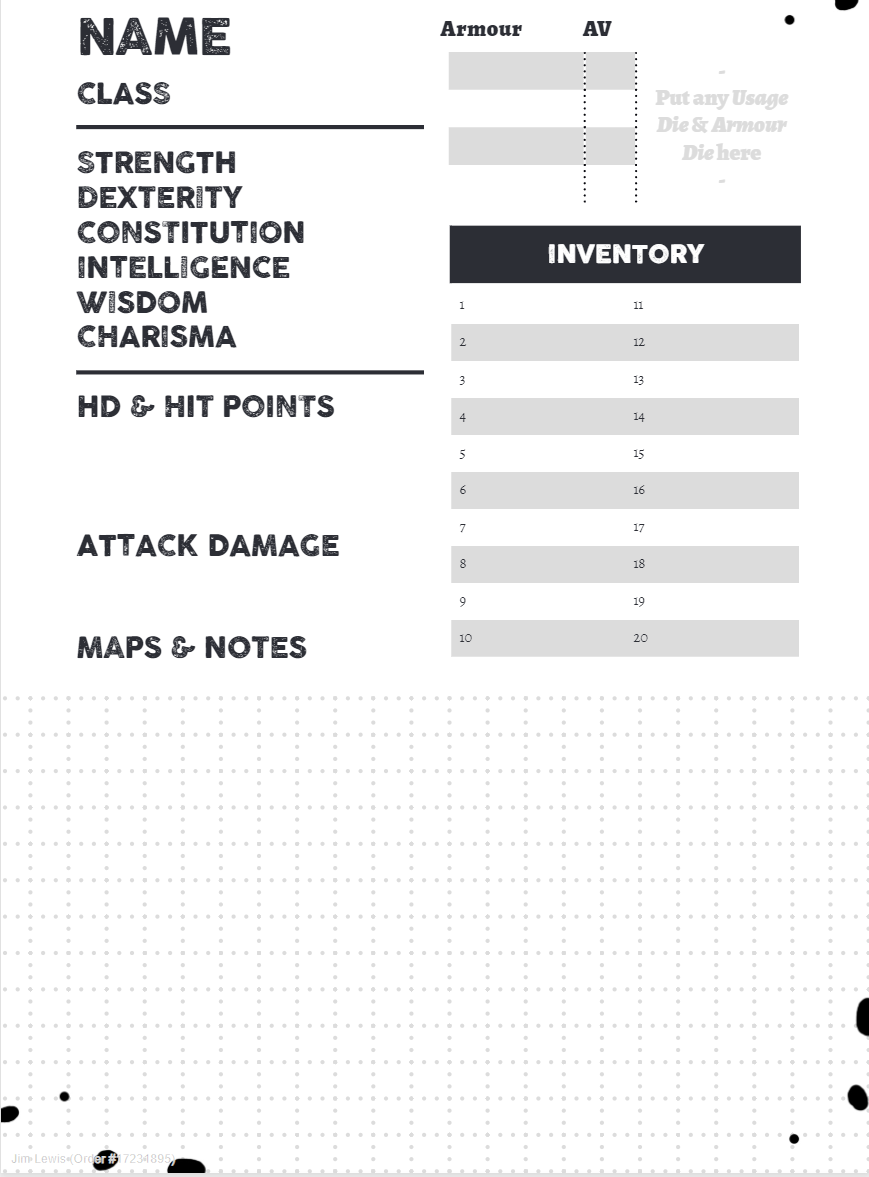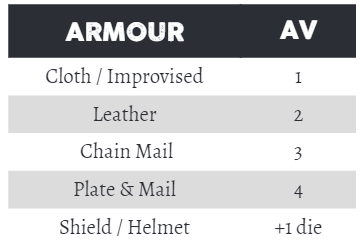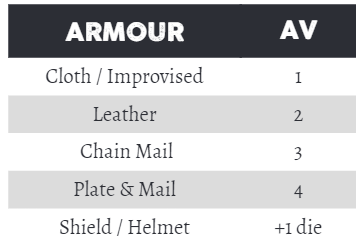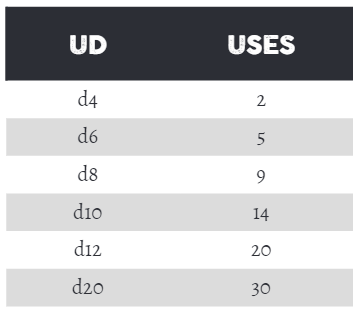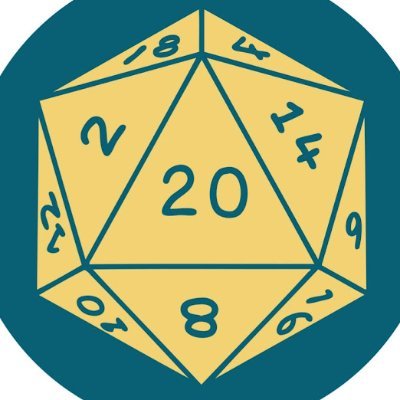
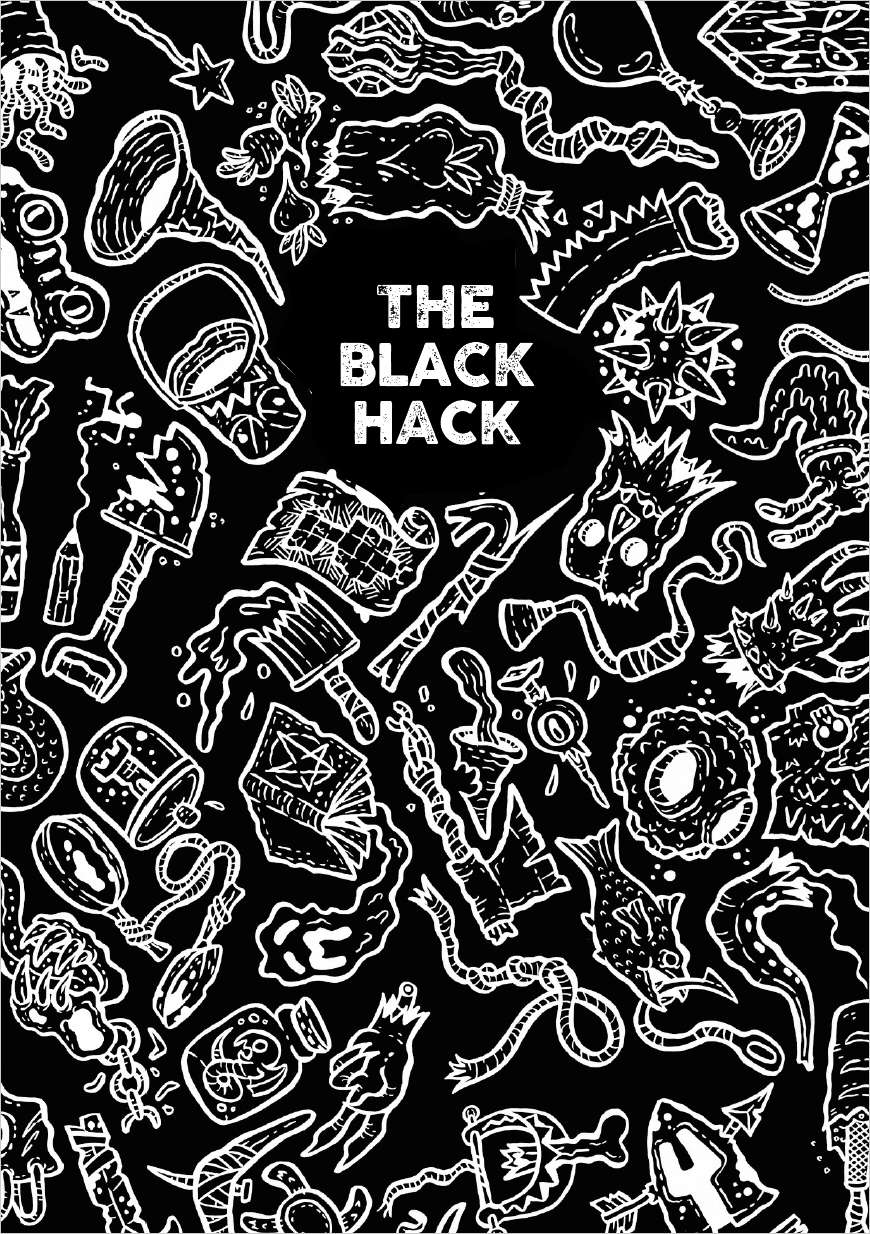

Overview
Pretty streamlined and cool OSR game. It has some very simplistic rules to get right into the action, with some cool ideas like Usage Die. The GM section is worth mentioning how great it is
- GM Friendly
- This has a TON of resources for GM's. This write-up is about the gameplay, but there are countless resources and tables for GM
- Super Fast
- With a roll under system with your DC being your attribute its very easy to get into play
- Streamlined
- These rules feel light, but punchy. Not a lot behind classes and skills, but its enough to get flavor

Resolution Mechanic
This is a roll Under d20 system. But Black Hack is a tougher game than normal. You have to roll under the target number, if you roll the target number you will fail. All rolls are attribute tests. This involves you trying to roll a d20 less than your attribute. So a Dex Test would be rolling the d20 and hoping to get less than your dex attribute.
Character Design
Ancestry/Race/Kin
There are no distinct differences with ancestry. Either everyone is a human, or you can play anything you like but it won’t change the mechanical creation of your character. It will just shape the narrative.
Attributes
Charisma Constitution Dexterity Intelligence Strength WisdomThese are the standard fantasy 6 attributes: Strength, Dexterity, Wisdom, Constitution, Intelligence, Charisma.
When you create your stats you roll 3d6 down the line without changing them. If you roll a 14+ on any stat you don’t roll the next stat, it just becomes a 7. After you are done you can swap any two stats
Skills
This is represented through backgrounds. The player can describe how their character’s background would help the situation and then they would get Advantage on the die roll for their attribute test.
The book offers examples and tries to encourage players to link their backgrounds to the world-building fiction.
Class / Profession
Cleric Fighter Thief WizardThere are 4 classes to choose from. These are the standard fantasy tropes. Warrior, Thief, Cleric, Wizard.
Each of these classes is contained on a single page, and has just enough concepts to bring out their flavor.
- The warrior has an abstracted ability that lets them dish out hits to lots of targets and keep their armor repaired.
- The Thief has all sorts of ways to get advantage on skills and do sneak attacks.
- The Cleric doesn’t like undead, is resistant to constitution effects and casts prayers.
- The Wizard casts spells and has an affinity for magical items.
Abilities/Power/Feats
There are not a lot of powers in the game, but they are very flavorful. My personal favorite is the Warrior’s ability called Dealer of Death. You get a dice pool of d6s equal to your Hit Dice (level). Whenever you make an attack action you get to spread these dice to different targets, then explain thematically how you are attacking each target. You then get to roll attacks against them and do damage. Very cool.
Each class will have its own flavor, that is well designed.
Besides this there is a single page with simplistic prayers and a single page of simplistic spells. These are categorized in levels, and are simple enough to give you an idea of what to do, and have leway to expound or RP the idea.
Equipment / Gear
There is a very streamlined system for coin and money. Its nice to see how the cost of an item (or the rarity) will determine the items Usage Die which is a resource talked about later down in action pools section.
Encumbered is carrying more items than your strength score.
Advancement
There is an interesting concept of Experience, story telling, and carousing.
Players have to complete certain experiences in the game. These could be defeating boss NPCs, completing NPC quests, discovering dungeons, or even failing so spectacularly at something. These are literal experiences.
When you have a number of experiences that equals your current level you can turn those in to actually level up. To do this you have to tell the other players a short story about your characters past for each experience point. You then have to roll a d6 for each story you told and take the highest of the rolls looking at the carousing table. This is supposed to signify you taking the party out for a party.
You then level up, which means you will get another Hit Dice and new features that are on your class. You will roll for each attribute you have, and you will try and roll over your attribute to level it up. Each class has its own variations of leveling to make it class specific
Combat
Initiative
Monsters in the MiddleBad guys in the middle initiative system. This means that players will make a Dex Test. As a reminder this is rolling a d20 and trying to get lower than your own dex attribute.
If you succeed you go before the NPCs. If you fail then you are going to go after the NPCs.
This is repeated after every moment or turn in combat. So initiative order will vary constantly as the combat goes on.
Turns / Rounds
There is a nice distinction of Moments vs Minutes. Moments are the turns you take in combat. Minutes are out of combat time to perform tasks.
Action Economy
You will get 1 Action and 1 Move. Your movement will shift you 1 degree on the distance track. Distance being: Close, Nearby, Faraway, and Distant
Can replace Action with another Move
Actions will most likely just be attacks, but technically they could be any sort of rp you would like to perform. You would just be making attribute tests in order to do them.
Attack Mechanic
Players will make a Strength attribute test to try and attack with melee weapons, and try to make a Dexterity attribute test to try and attack with a ranged weapon.
Damage that is done is determined by the class. If they happen to have a large weapon they are able to do an extra d4 to attack and damage.
Critical hits do double damage to the enemy
Defensive Mechanic
Players will be rolling to not be hurt by attacks. The GM is not going to roll any dice. If the player is being attacked by a melee attack they perform a Strength test. If its a ranged attack they roll a Dexterity test.
Armor System - Different armor has different Armor Values (AV). If you have Leather armor you have 2 AV for instance. This means, any time during an encounter you can use 1 of these dice to reduce all damage from an attack you don’t defend against. Each die is considered broken until you are able to repair it. This is done by rolling that d6 and trying to get higher than the AV number. This shows that Plate has more ability to absorb hits but is harder to repair (makes sense).
Shields and Helms get +1 AV dice each. You can have as high as 6 AV dice, but do these things have drawbacks? Only that if you are not proficient in it you add to the roll of attribute tests.
Modifications to Resolution
Advantage/DisadvantageUtilization of the Advantage, and Disadvantage mechanic. You will roll an extra die and either take the higher or the lower of the two.
Correction. The Rules state that if you role Advantage the player chooses whichever result they want on two dice. Disadvantage is then going to be the GM choosing which result on two dice.
This distinction is important. It means the GM might lean towards the side of drama. They might choose for you to succeed. This focuses more on the narrative nature of the game technically then just the dice doing what they want.
This could be with any dice. Usage Die, Random Encounter Die, etc
Conditions
Conditions are referred to as hindrances in this game. There are only 4: Weakened, Distracted, Stuck, Paralyzed.
- Weakened - disadvantage to all skill checks
- Distracted - can’t perform actions but can move
- Stuck - can’t move but can perform actions
- Paralyzed - can’t do move or actions
Environment
Movement is abstracted. You can utilize grids, but for the most part they just utilize Close, Nearby, Faraway, and Distant
You can convert these to actual grid distances: 5ft, 30ft, 60ft, more than 60ft.
Resource Management
Time or Scenes
This is cleaning broken down into the concepts of moments and minutes
- Moments are used during combat and represent split seconds - when everyone is attempting to act at once, often against one another.
- Minutes are used when exploring and adventuring. They represent a dozen or so real minutes - when time is not of the essence
Rest Mechanic
If you rest for an hour you can roll your broken armor die, and you can roll 1 hit die.
If you can rest a full day without doing strength or dexterity checks then you can roll all your hit dice and get all those hit points back.
Interesting to consider a full day of rest being 12 hours without making a Strength or Dexterity attribute test
Resource
The Usage Die or the (Ud) is a cool concept for consumables. Anytime you have to use something you roll its Ud, and on a 1 or a 2 you step the dice down. So you have arrows Ud8. If you rolled it after use and got a 1 or 2 it would become a Ud6. If you roll a 1 or 2 with a Ud4 then you would be out of that item. Rolling for ammunition is done after combat.
Health & Dying
Every character will have Hit Dice and Hit Points. They roll their Hit Dice to determine their Hit Points and will roll new Hit Dice when they level up.
On-going Damage - interesting that the amount of ongoing damage is same as the creatures Level. Not the casters? But the person who is taking damage?
If you are knocked out in combat you have to first hope that your side wins. If they win you roll a d6 on a chart to see what happens. A 6 means death, the other results all add other potential negative modifiers but you do gain hit points back (1d4).
Monsters - all use d8s for their HDs
Magic System
Characters are able to memorize a number of spells equal to their level, and the spell level can only be up to their current level also.
Casting a spell just happens. But after you cast the spell you need to make an attribute test and add the spell’s level to the roll. If you fail you are going to lose that spell from your memory. If you are casting that spell more than once then subsequent rolls are made with disadvantage. So much cleaner than spell slots
You can also cast spells directly from books or scrolls, but these have a chance to misfire, and are harder to cast. Arcane is intelligence and prayers are Wisdom
Character Sheet
